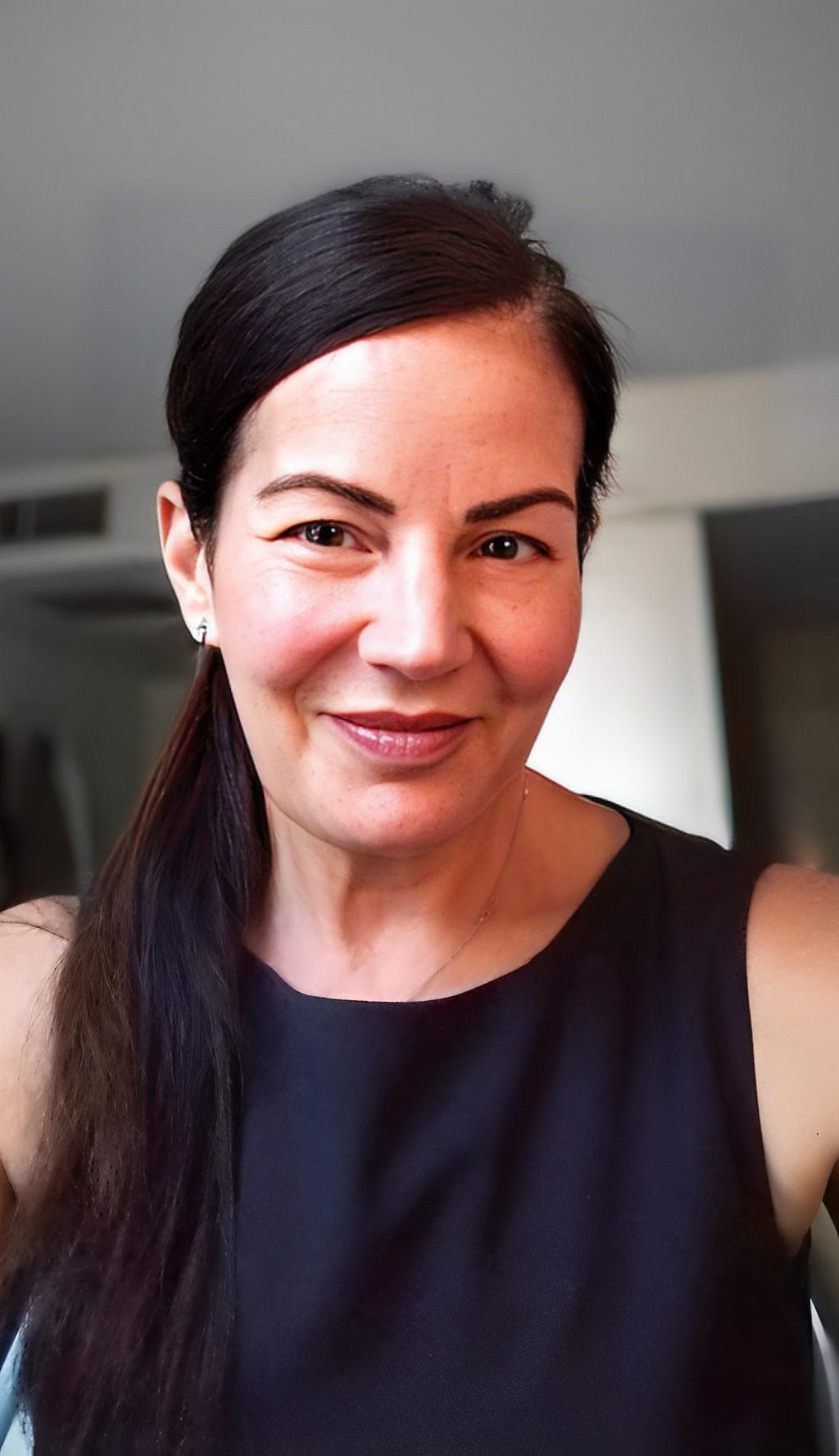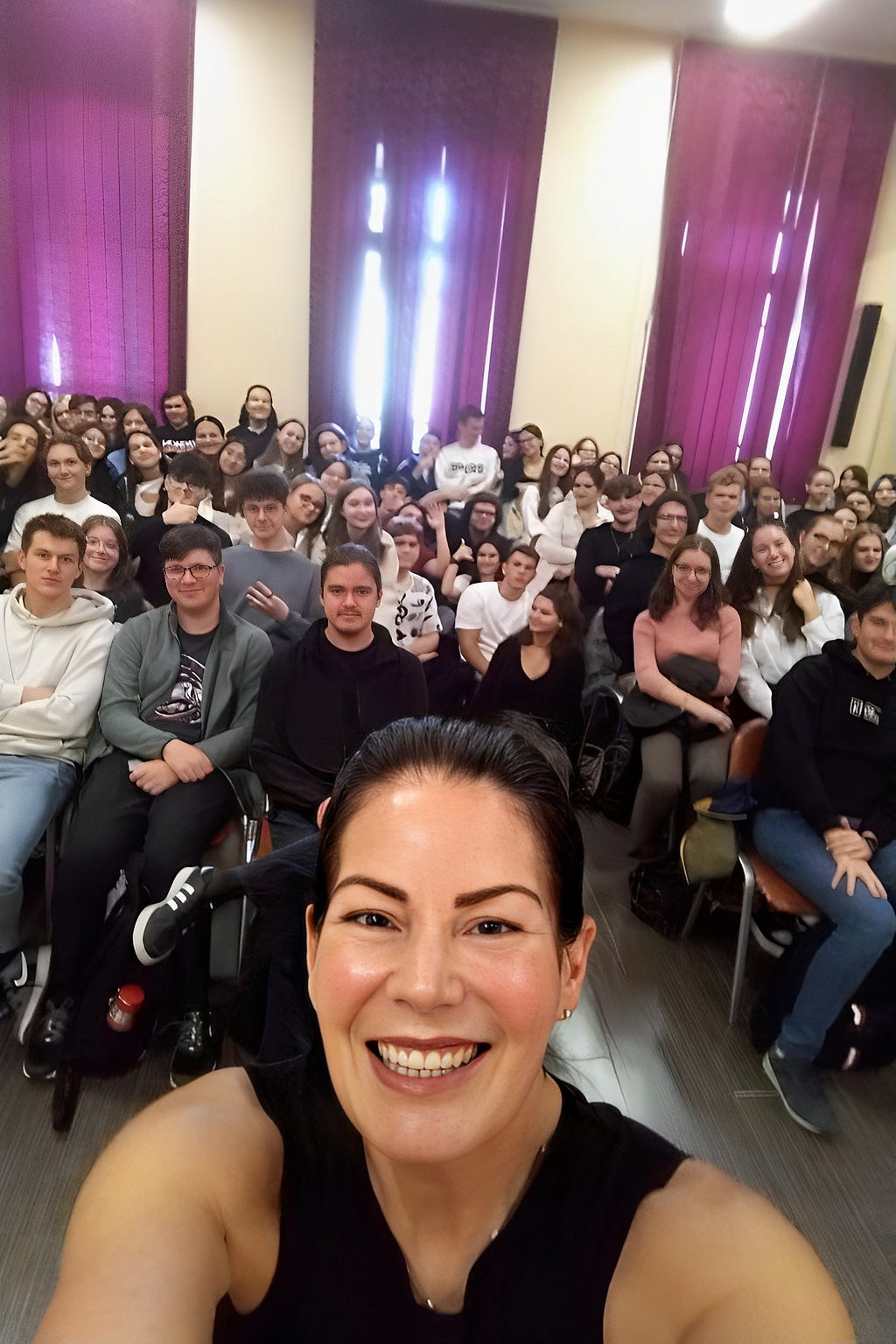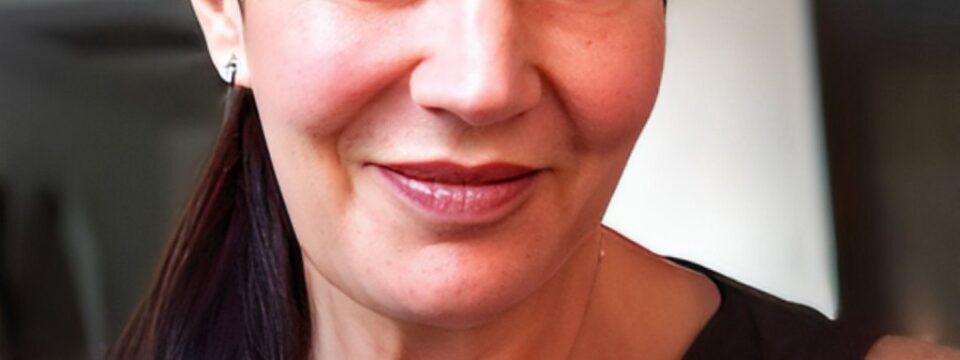Filmmakers Making A Social Impact: Why & How Filmmaker Rosemary Smith of Getting Better Foundation (GBF) Is Helping To Change Our World

I wouldn’t have believed it, but I wish someone told me it would all be worthwhile. Just do it anyway. Oh, wait, Mother Teresa may have told us this. 😉
As a part of our series about “Filmmakers Making A Social Impact” I had the pleasure of interviewing Rosemary Smith. Rosemary is the Managing Director of Montana based Getting Better Foundation (GBF) whose mission is to build trust in our world. They primarily support media literacy education and legislative efforts and produced the award-winning and U.S. State Department darling, “Trust Me” Documentary. Rosemary serves as the film’s Impact Producer — traveling the globe as a State Department envoy and media literacy expert — screening “Trust Me” and hosting educator workshops on how to empower students and communities with media literacy.
Thank you so much for doing this interview with us! Before we dive in, our readers would love to get to know you a bit. Can you share your “backstory” that brought you to this career?
My “backstory” in media literacy started with owning and operating local radio stations with my husband. Our Eagle Radio Group recognized early on that, although the Fairness Doctrine had been eliminated, credible, solutions based journalism is the root of Democracy and empowerment of people in all communities.
Learning how to discern media is not a new topic. Historically, people had to learn to consume vast amounts of news… with the advent of the printing press — which speeded up receipt of news from essentially word of mouth communication. Then with every new medium — radio, television, now the internet — people had to ramp up their digestion of media with new skills and more brainpower. What’s new today is the speed at which we can consume media — and, of course, with the advent of platforms, the speed at which they create media for others’ consumption. Most everyone now has a voice. With that privilege, we have a responsibility to foster truth and messaging that helps empower others… or that can hurt them.
GBF’s CEO and “Trust Me’s” Executive Producer, Joe Phelps recognized and adopted media literacy as a weapon for people to arm themselves with that would provide their mental health with a shield against online manipulation. Since we highly value our Freedom of Expression, it would be difficult to legislate a cure. And do we really wish to entrust for-profit social media platforms with censorship tools?
We feel education is the answer.
When I came onboard GBF, we decided to support media literacy education and legislative efforts. We sought and aligned with Oscar-nominated ® Director Roko Belic to produce “Trust Me”. Roko filmed empathizing stories across the globe, where media “ill-literacy” led to crises. Then, our GBF Advisory Board Experts — big thinkers like Harvard’s Steven Pinker, Claremont Graduate University’s Paul Zak, Skeptic Magazine Editor Michael Shermer, LA Times’ Martha Groves, IAMnottheMedia’s Jimmeka Anderson, and University of Rhode Island’s Renee Hobbs provide positive direction — a kind of cognitive behavior therapy for the masses — with their wisdom about how our brains work and what we can do to counter online manipulation to empower ourselves and others.
It has been said that our mistakes can be our greatest teachers. Can you share a story about the funniest mistake you made when you were first starting? Can you tell us what lesson you learned from that?
Oh, goodness… as a primarily self-educated media literacy expert, learning from mistakes is my motto! Mistakes create wisdom. Mistakes enable us to become empowered by experience, right? I believe every mistake is a blessing in disguise. Children make many mistakes learning to read, write, and ride a bicycle. We don’t give it a second thought that this is how they learn. So, why are we adults so hard on ourselves when we make a mistake?
Early on in production of “Trust Me”, our film crew was onsite at the Newseum in Washington D.C. We were guests of NAMLE — National Association for Media Literacy Education. NAMLE graciously allowed our Director and Cinematographer to record expert interviews in the historic John S. & James L. Knight Foundation studios. When we arrived, we noticed the studio was kept unseasonably chilly. We learned that the studio was also host of the Newseum’s film and newspaper archives — the temperature allowed for preservation of the paper and film stock. Well, we all know what human bodily reactions occur due to extreme cold. Teeth chatter, skin pallor and lips turn blue. Eyes and noses water. Extremities turn rigid. Our first interviewee was no exception. She is a lovely person — typically well-spoken and well-heeled — but on that day, the cold got the best of her and her auburn colored silk blouse revealed all. Embarrassing to all concerned and too bad too — as we were unable to include her words of wisdom in our film.
I learned to scout locations as far ahead of time as possible… and to have a suit jacket on hand for guests!
Who are some of the most interesting people you have interacted with? What was that like? Do you have any stories?
Oh, our Getting Better Foundation advisory board is made up of big thinkers and doers, like Harvard’s Steven Pinker, Claremont Graduate University’s Paul Zak, Center for Media Literacy’s Tessa Jolls, LA Times award-winning journalist Martha Groves, and UK House of Lord’s Matt Ridley. They are all treats and academic geniuses. But some of the most incredible people we met were the ones willing to share their stories. Stories where a lack of media literacy led to personal crises. They shared these with humility, with some tears, with compassion, best intentions, and with empathy for others. They knew it would not be easy re-living their regret and shame. But, they did it anyway in the interests of humanity… hoping to prevent others from succumbing to ills from online manipulation.
People like Chicago Parents David Blackmon and Sandra Shettleworth-Tebbanah who were frightened to let their teen kids out of their sight because of the vast amount of negative news since the advent of the internet. New Zealand’s Williams’ family who nearly lost their young son to a totally preventable disease due to antivaxx misinformation. Telengana, India’s Superintendent of Police, Rema Rajeshwari who fights online misinformation daily. Murki’s Mohammed Asman family and the lynch mob who killed their son due to misinformation circulating on WhatsApp. San Francisco Teacher Valerie Ziegler, and Mountain Middle School’s Principal, Shane Voss who are empowering students with media literacy and civics education. These people opened their hearts to help us create empathy and share the reality of online manipulation repercussions to help protect others.
Which people in history inspire you the most? Why?
I love history. I guess the people who inspire me the most are those who worked hard to ferret out and put into place a Bill of Rights to protect the freedoms of the people of the United States, especially: “Congress shall make no law respecting an establishment of religion, or prohibiting the free exercise thereof; or abridging the freedom of speech, or of the press; or the right of the people peaceably to assemble, and to petition the Government for a redress of grievances.” It’s incredible to think these statutes stand today… are contested today… and have stood the test of time since 1789. I wonder what James Madison and George Mason would think of our struggles with these Freedoms since the advent of the internet?
Let’s now shift to the main focus of our interview, how are you using your success to bring goodness to the world? Can you share with us the meaningful or exciting social impact causes you are working on right now?
This… this is where our joy comes from. We initially believed “Trust Me” would become dated very quickly. After the 2022 election. Then, the pandemic. And, then the January 6th insurrection. These events have only added to the timeliness… and timelessness of the film. Librarians and Educators consistently commend us for non-politicizing media literacy. If we had covered covid instead of tetanus antivaxx… or included Trump’s presidency instead of an overall Russian and foreign interference in democracy, the film would create polarization in the classrooms, at home with families, and in communities — exactly the opposite of what we are trying to achieve… lessen polarization. Enable people to trust one another. When people trust one another, they are able to operate in that “gray” area where they can consider others’ opinions. When they do that, collaboration on the bigger problems our world faces, and solutions are possible. We have a testimonial reel from students in Romania’s Moldovan region. It’ll bring tears to your eyes to hear how much the film meant to them and how they misperceived the enormity of problems due to online manipulation. I’d be happy to share that audio with you, but in the meantime, here’s a few testimonials of what “Trust Me” meant to these viewers:
Janja Šestak — Croatia University journalism student “The screening of “Trust Me” at Thessaloniki’s THISAM academy left a significant impact on me. Our fellow journalism students and I agree we didn’t understand how people can be misled by news and how crises arise from it. We are all now cognizant of the fact that our career choices are important and will make a difference in the world.”
Amie Hoagland-Metcalf, Headwaters Academy Middle School: “This documentary was one of the best I’ve ever seen. I loved both versions of it. Thank you so much! I can think of so many educators and parents who should watch this. Well done to everyone on your team!”
From U.S. Embassy — Bucharest screenings:
Students:
Adina, Craiova: ”It was very interesting to discover some narratives I see online also in the documentary. It really helped me understand the scale of the disinformation online.”
Marius, Constanța: ”It made me realise how dangerous it is for my grandparents and parents who are struggling to verify the information they are exposed to. It made me feel like it is my responsibility to help somehow.”
Cristina, Bacău: ”How can we make the difference between messages online, the fake ones and the real ones? Especially since the war has started, we are under attack with fals news and this documentary helped me find hope again. I really liked the optimist ending.”
We even had a high school student faint due to the fact that the film really hit home for her.. a victim of school bullying.
We’ve been partnering with the U.S. State Department and NATO as they’ve declared media literacy a strategic defense initiative and are supporting screenings at Embassies, American Corners, Universities, and High Schools globally. We collaborate with hundreds of organizations for screenings at conferences, schools, universities, and have provided the film and its curriculums for K-12, Colleges, Libraries, and Parents to over 40,000 U.S. High schools, Veterans, Parental, and Correctional Organizations. We are a small but mighty team dedicated to pursuit of truth to build alliances and spread good.
Many of us have ideas, dreams, and passions, but never manifest it. But you did. Was there an “Aha Moment” that made you decide that you were actually going to step up and take action for this cause? What was that final trigger?
Ahhhh-hahhh…. My husband and I’d sold our radio stations in Michigan and moved to Montana to be closer to our adult kids. I prayed to God for work that would enable me to share skills and resources I’d built as a result of being a broadcaster, a mom, a self-educated psychologist and nutritionist with those hurting from exposure to the meanness of our world.
My Husband actually found an ad for the Getting Better Foundation’s managing director and thought it sounded like the “hooker-upper” things I like to do.
Once I’d shared my passion for bringing awareness of media literacy to fight adolescent anxiety, depression, substance abuse, and suicidology with founder and CEO, Joe Phelps, a bond was forged that will never break. We both have stories where we or a loved one suffered from what we call “media ill-literacy”. We believe it’s a great time to be alive but most people don’t recognize the progress our world enjoys. All generations have faced consequences dealing with new media — since the advent of the printing press, radio, television, and now the internet. What has changed is the speed at which we share and disseminate information.

Can you tell us a story about a particular individual who was impacted or helped by your cause?
I will recount story of the “fainter” I’d mentioned earlier. The room was dimly lit and closed curtained due to our film screening in Iasi, Romania — not far from the Moldovan border — in an honors high school auditorium filled with students, a few teachers, and the school’s principal — it was standing room only.
At first, when the scene on the screen was highlighting Principal Shane Voss recounting how he believes social media’s addictive nature is leading to teen anxiety and suicides, and she fainted, our first thoughts were “Open the curtains, windows, and doors so we all don’t get covid!”.
We stopped the film in order for the student to be taken into and attended to in the hallway. Her teacher came back into the auditorium to communicate that the student was going to be alright. She wasn’t physically ill. She was overcome with emotion due to the content being so close to her — a victim of bullying and suicidology. “Trust Me” got her to vocalize her feelings, overcome the stigma of and ask for help. She later asked if she could watch a private viewing of the film with her parents — thinking it would allow her to open up to them about her feelings.
Are there three things that individuals, society or the government can do to support you in this effort?
- Watch “Trust Me” with family, friends, community, schools, organizations. All proceeds from the film’s screenings or licensing to our 501c3 Getting Better Foundation benefit media literacy education and legislative efforts. www.trustmedocumentary.com
- Ask legislators in your state to support media literacy and civics to empower students. Model legislation is available at www.medialiteracynow.org We will make free screenings available to lawmakers to help open their eyes to the repercussions from online manipulation and work with them on curriculums they can share with educators.
- Support the good guys — people working to instill media literacy and civics education — and sign the petition asking the White House, the U.S. Department of Education, and Lawmakers to support media literacy and civics education: www.gettingbetterfoundation.org
What are your “5 things I wish someone told me when I first started” and why? Please share a story or example for each.
- I wish someone had told me I’d cry every time I made someone smile.
- I wish someone had told me it was okay to cry.
- I wouldn’t have believed it, but I wish someone told me it would all be worthwhile. Just do it anyway. Oh, wait, Mother Teresa may have told us this. 😉
If you could tell other young people one thing about why they should consider making a positive impact on our environment or society, like you, what would you tell them?
Just. Do. It.
You will always regret making someone else feel bad, stealing, or cheating. You will never ever ever regret lifting someone else up.
We are very blessed that many other Social Impact Heroes read this column. Is there a person in the world, or in the US, whom you would like to collaborate with, and why? He or she might see this. 🙂
Doggone it, but Melinda Gates needs to watch this film. I’ve asked her and the Gates Foundation to spend 90 minutes — I’d even share the one-hour made for public television version for busy people. I think they’d recognize how life-changing “Trust Me” is for viewers globally.
Oh, and although he’s not U.S. based and the collaboration might be tumultuous, Vladimir Putin should watch “Trust Me”.
Can you please give us your favorite “Life Lesson Quote”? Can you share how that was relevant to you in your life?
“And we know that all that happens to us is working for our good if we love God and are fitting into His plans.” — Romans 8:28
How can our readers follow you online?
Websites | www.gettingbetterfoundation.org
Facebook | @trustmedocumentary
Instagram | @trustmedocumentary
Twitter | @trustmedocfilm
This was great, thank you so much for sharing your story and doing this with us. We wish you continued success!
We are grateful for this opportunity and your time and consideration — Rosemary Smith
Filmmakers Making A Social Impact: Why & How Filmmaker Rosemary Smith of Getting Better Foundation… was originally published in Authority Magazine on Medium, where people are continuing the conversation by highlighting and responding to this story.
